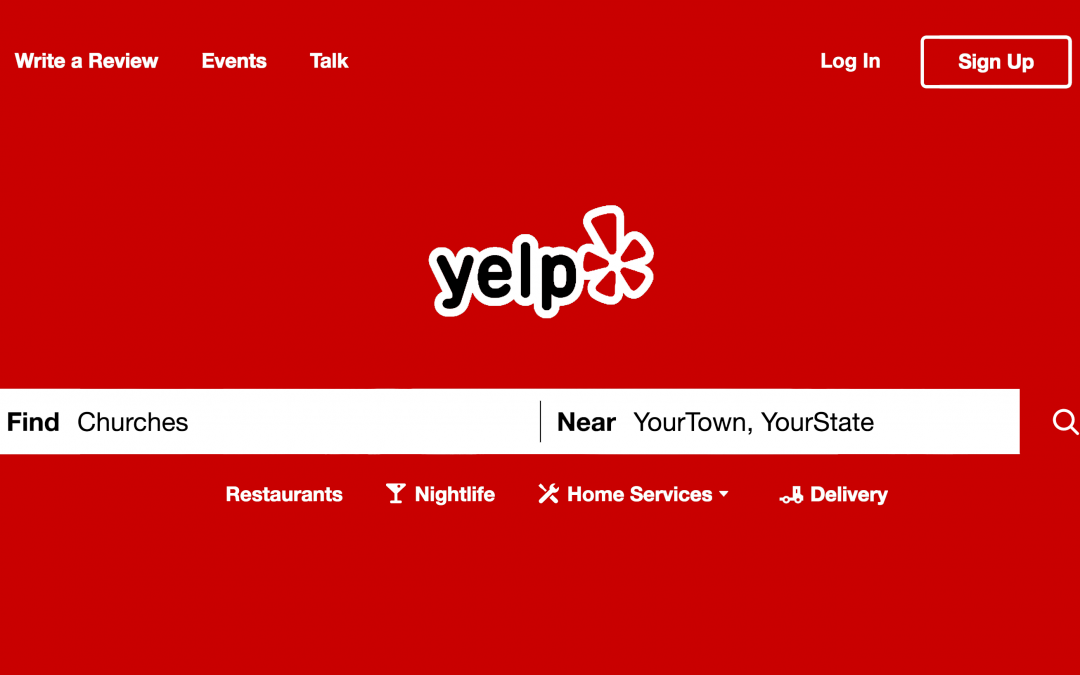Not just for businesses—Yelp is also beneficial for churches & other nonprofits!
If your organization has a local audience* and is on Yelp, there is great potential. It may be daunting at first to open up your organization to public opinion, but it’s a strong step forward if you are prepared to approach it with care and with consistent monitoring.
Just having a claimed Yelp entity lets the public know that yes, you are a legitimate organization and you are transparent enough to allow online discourse. But don’t stop here. Aside from reviews, you can use Yelp’s popularity to improve your web presence. Your Yelp page can serve as another listing in search engine results, which helps build brand awareness and increase the chance for clicks to your content.
Dress up your organization’s profile
- Once you’re claimed, make sure all address and contact information is correct, current, and in exact agreement with your website. You want to use the same address and phone number every time your organization is represented online.
- Write your descriptions with care. Tell your organization’s story, making sure to connect it with your audience’s interests, rather than what you think is great. Think of keywords related to your organization that match what people might be searching for on Yelp.
- Add pictures! You can add some yourself, and your audience can add some as well. What types of images would best represent what your organization can offer?
- If applicable, add your business hours so people know when they can call or stop by.
- Add calls to action. You can create a button to send a message, make a reservation, call for an estimate, etc.
- Monitor your listing! Make sure you’re using your organization’s email address and check it regularly, so you can respond to reviews—both good and bad.
But what about negative reviews?
There’s always the chance for a negative review. It can plague even the best. Mistakes do happen, and sometimes people just want to rant.
But fear not! There are ways to handle negative reviews that can actually improve your public image.
- If there was an honest mishap, apologize for the person’s experience and assure them that their experience was not your organization’s intention and that this occurrence is not the norm. If further investigation is necessary, simply reply that you’ll be looking into it and will keep in touch.
- Acknowledge your reviewer’s feelings and refrain from arguing, even if they are in the wrong—that will only escalate the online exchange. Instead, offer your sympathies that this happened. Uphold what your organization stands for and what it seeks to accomplish, and if it feels right, invite them to return and introduce themselves.
- If there is a true misunderstanding that can be easily corrected by explaining the facts in a careful, sympathetic way, go for it. Make sure to put yourself in the reviewers shoes and try not to sound unintentionally condescending. Do apologize that they received a different message than what was intended.
- If the review is truly a rant or an overly emotionally-fueled misunderstanding, that does make things tricky—especially if you don’t know what they’re talking about! If you suspect that this is fake, you can mention that you have no memory of this incident or that you can’t find a person/event that fits their description (if indeed that is true).
In all cases, if possible, offer a way for them to contact you directly so they can provide more details or ask other questions. Many ranters won’t actually bother with this, but it will often stop them from posting more negative reviews. Additionally, if a review is poorly written or includes name-calling, many other viewers can spot these “trolls” and disregard their reviews—especially if you have several other positive ones!
So how do we get better reviews?
Before getting into this, a note of caution: Organizations are NOT supposed to ask for reviews. In fact, Yelp is adamant that if they detect any details that make a review seem solicited (or even encouraged), they can remove the review or even make your organization rank lower in their search algorithm.
What you can do to encourage positive reviews is simply to let your audience know that you are on Yelp. You may have seen businesses with posters on their windows that simply say, “We’re on Yelp!” You can also add the Yelp icon to your website, blog, social media images or other promotional materials. (You can include icons of other review sites as well, such as Facebook, Google, Yellowpages, etc.) Your audience will catch on.
For more information on maximizing your Yelp potential, check out these articles:
- Responding to Negative Yelp Reviews: https://www.toistersolutions.com/blog/2014/6/16/how-to-respond-to-negative-yelp-reviews
- Yelp Cracks Down on Review Solicitation: https://searchengineland.com/yelp-increasingly-cracking-review-solicitation-across-internet-286290/amp?mc_cid=b1a85cc858&mc_eid=8900c747ed
- Yelp’s Guidelines for Responding to Reviews: https://biz.yelp.com/support/responding_to_reviews
*There are only a few types of organizations that will not need a Yelp page, such as those without a brick-and-mortar location, or possibly those with a physical location but that serve a national or global audience. However, any organization with a physical address should check Yelp to see if there is already an existing listing. If so, you’ll want to claim it simply to safeguard it from others claiming it instead.


Recent Comments